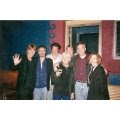
Artist: Son of ’76 & the Watchmen
Title: Letters from Shangri-La
Writer: Rick Galusha
Rating: 7
“Letters from Shangri-La” is the latest release from the Nebraska based roots rock band, ‘Son of ’76 & the Watchmen.’ Debut albums often tend to be a “kitchen sink” affair where the band throws in years of songwriting creating an album of mixed styles, multiple themes and influences. That this is the third album from the band only adds to their genre defying mystic. Unfocused albums require more interactive listening and since an uncommitted fan is, at best, a passive listener, this album does not unfold itself easily to the ear.
Led by Josh Hoyer’s rootsy barenecked vocals, the album includes songs with a hint of New Orleans (Katrina Revisited), a harkening of Ireland (Annie’s Heart), Roy Orbinson (The Moon) and an Americana base that transcends defined categories; think of Tom Waits fronting the Outlaws singing Dave Alvin material from the ‘Blackjack David’ period. Because of the length, 15 songs, the album can easily lose the listener as it jumps from style to style. This is an album that will challenge the listener’s commitment to wait, listen and find the beauty that lies within.
Hoyer uses the album to sing about two of the region’s darkest themes.
On his 1982 release, ‘Nebraska’ Bruce Springsteen sang of a mass murder spree in 1958 that spread across Nebraska and into Wyoming. Born in Lincoln, Nebraska, Charlie Starkweather and accomplice Caril Ann Fugate spread fear across the state as they murdered her family and others. While Springsteen sang from Starkweather’s perspective, Hoyer sings from the perspective of the fictional son of Starkweather. It is a harkening to the dust bowl song theme of criminals and hero’s. On '
Outside Looking In' Hoyer sings of Nebraska’s shame today: Whiteclay is an unincorporated village of 14 residents with four package stores that peddle 3 to 4 million cans of beer per year to the dry Native American Pine Ridge Indian Reservation's 38,000 residents. Much like the track 'Place I Know,’ from Indigenous, Hoyer sings of the alienation and hopelessness of living amid a Reservation community where alcoholism rates exceed 60% of the adult population.
Devoid of overt catchy pop-tracks, “Shangri-La” leans heavily on the piano tracks of Nicholas Semrad to hold the band’s sound together by moving smoothly behind the lead instruments adding depth and texture.
At its core this is a very good but complex album that does not easily unfold. Anyone willing to invest the effort to experience the immense depth of this record will become acquainted with a true artistic expression that sets aside any pretext towards commercialism. A glance at today’s sonic landscape puts ‘The Watchmen’ in a vein of developing along a line of contemporary music that haunts dingy taverns and make-shift venues aspiring towards an appearance on Austin City Limits. For the true music connoisseur this record will become a precious gem but recognized as such by only a few. The songs are well composed and the musicians bring the songs to life. After numerous listenings the album rises above well above 'regional release quality' to become a solid foundation for national aspiration. Time and again we see maturing artist focus their sound to capture a wider audience. While this tact can build an audience, it is often done at the expense of art.
Being a recovered independent retailer I appreciate the bands, ‘Big Box Store’ track bemoaning the homogenization of America’s small towns and retail landscape. More accomplished radio hosts might focus in on ‘She’s the Kind of Woman’ or the beautiful uptempo ‘Avalee,’ where Hoyer sings to instill hope in a daughter and that she has “got to believe” something better awaits in her future. Should ‘Son of ’76 & the Watchmen ‘ cast aside the comforts of home and hit the road something better may await their future: this is an act with promise and worthy of keeping an eye on.










